

On Easter Sunday, April 4, 2021, what should have been a joyful holiday turned into a nightmare for the Olarewaju family.
Michael Ayowale Olarewaju, a promising young man, was brutally murdered along the Lagos Ibadan Expressway while returning to Lagos from a function.
He was travelling with four other passengers when their vehicle was ambushed by kidnappers attempting to abduct them for ransom.
Michael’s life was cut short in a moment of sheer horror, leaving behind his only daughter, little Eniola Serah, who now grows up without the warmth of a father’s love.
His siblings, Solomon Olukayode, Simeon Oladayo, Peter Olawoyin and Temitayo Hannah together with his aged parents, Joshua and Elizabeth, remain inconsolable as they grapple with the sudden loss of a beloved son, bread winner and brother.
His tragic death is yet another painful reminder of the reign of kidnappers and bandits who have turned Nigeria’s roads into corridors of blood and fear. From the North to the South, the scourge of insecurity has left families shattered and communities unsafe.
Many victims, often successful individuals or returnees from abroad are specifically targeted in order to extort ransom money from their families. Some are eventually released after payments; others, like Michael, never returned home.
A recent BBC investigation highlighted how rampant kidnappings have become, underscoring how Nigerians now live under constant threat on highways once known for commerce and connection. For families abroad, the fear is even greater, as returning home with loved ones will definitely make them prime targets for these unscrupulous criminals.
The murder of Michael Ayowale Olarewaju is not just a family tragedy, it is a national wound. It raises yet again the urgent question: how many more lives must be lost before successive governments summon the will and capacity to confront the insecurity epidemic consuming the nation?










